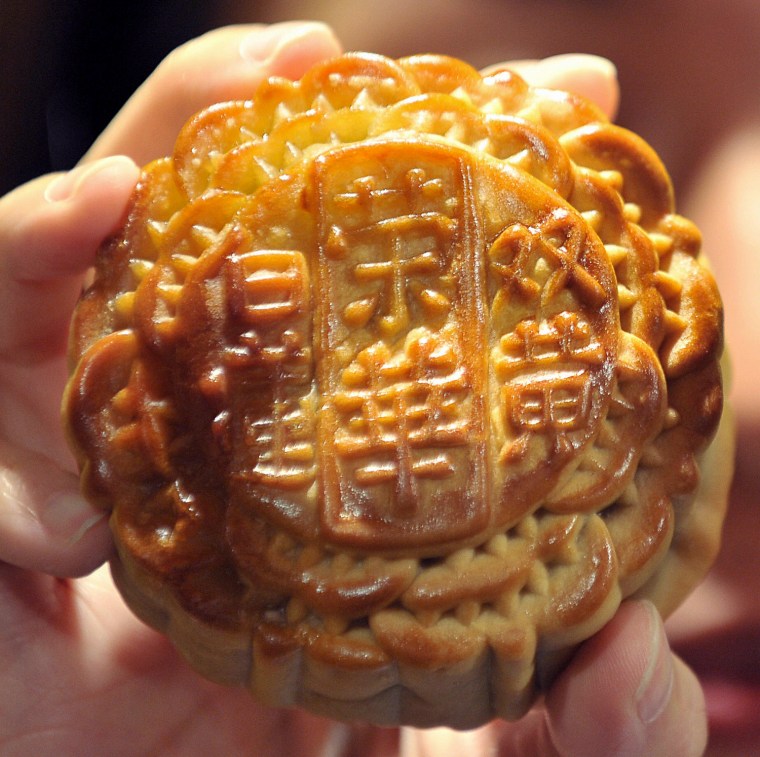BEIJING – The latest casualty in China’s ongoing campaign against corruption is perhaps its sweetest one yet.
Earlier this week, Chinese state media announced that officials here would be prohibited from using government money to purchase mooncakes – a popular dessert traditionally given as gifts during this month’s Mid-Autumn Festival.
Chinese President Xi Jinping was quoted in a statement by the Communist Party’s Central Commission for Discipline Inspection saying that the use of government funds on extravagances like gifts, meals and drinking must be stopped.
"The Mid-Autumn Festival and the National Day are approaching, we must resolutely put an end to using public funds," the commission quoted Xi as saying in reference to gifts and extravagant government waste.
At first blush, the notion that restricting the purchase of holiday treats typically filled with egg yolk and lotus could be a serious step in the fight against China’s rampant corruption seems like a gigantic stretch.
But the new law is a step, albeit a small one, towards dealing with a problem endemic to corruption in China: the blurring of traditional customs and government business.
Since China’s opening up decades ago, it has increasingly become custom for businessmen here to use holidays like the Mid-Autumn Festival as a time to lavish officials who control key aspects of the Chinese economy with gifts to curry favor and pave the way for future dealings.
It’s a problem that China’s ruling Communist Party has long known and understood, but has had little success in dealing with.
“In the 1980s and '90s, Beijing issued similar regulations for limiting government gifts during holidays, it’s long been a serious problem,” said Ren Jianming, Director of the Anti-Corruption Research Institute at Beihang University in Beijing. “If the government is serious about this and extends the ban to other holidays like Chinese New Year next year, then this will have a positive outcome.”
On Chinese social media, where official corruption is a daily gripe, the ban was met with mixed emotions.
“The government did strengthen the anti-corruption laws after the 18th National Party Congress and it has exerted some good influence,” wrote one user on Weibo, China’s Twitter-like service. “If the government can keep doing similar things, maybe one day people will finally feel its efforts.”
But others though balked at the mooncake ban, saying it didn’t go far enough.
“Who is giving mooncakes as gifts?!” demanded one writer. “Shopping cards and bank cards are what officials are really receiving these days!”
“It’s all worthless if related laws are not enacted or improved,” wrote another. “In my opinion it’s all just government boasting.”
Since taking power late last year, Xi has spoken passionately about eliminating corruption at all levels, claiming he would bring down dirty officials whether they were “tigers or flies.”
To date, the campaign has netted far more flies than tigers, but in recent months more high level officials have been detained under “shuanggui,” the ruling Communist Party’s system of extrajudicial discipline, building momentum for Xi supporters in his first year of power.
The detention this week of Jiang Jiemin, the former director in charge of the State-Owned Assets Supervision and Administration Commission – the powerful organization responsible for managing the central government’s massive state-owned enterprises – and perhaps the biggest official to be toppled so far, has forced cynics here to re-evaluate the seriousness of this anti-graft campaign.
“The changes are quite obvious, the leaders have placed great importance and determination on anti-corruption,” said Ren. “This time, the leaders are dealing with corruption from the highest organizations to the grass roots.”
But even as individual officials are brought down each week as an example to others – “killing a chicken to scare the monkeys” as the practice is colloquially described here – the question remains whether this practice is truly curbing official corruption or whether it’s simply masking its symptoms.
An official may forsake a lavish meal or the exchange of mooncakes, but it doesn’t change the fact that institutional barriers such as low government wages, far-wielding powers and an opaque review system for officials make dealing with corruption an uphill battle for Beijing.
NBC News’ Le Li and Pei Huang contributed to this report.
Related:
